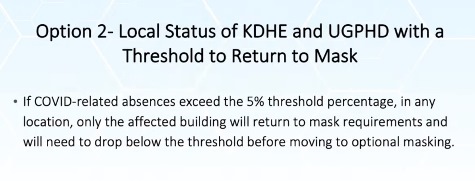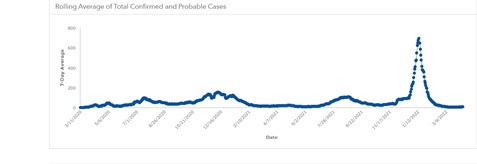by Noah Taborda, Kansas Reflector
Topeka — In the waning hours of the veto session, the Kansas Legislature approved a rewrite of the state’s public health laws, disregarding bipartisan concerns the bill was too restrictive.
After weeks of conversation and modifications to proposed legislation, Senate Bill 34 came together shortly before the House and Senate debated the bill. The response to government actions taken during the COVID-19 pandemic targets mask mandates, quarantine orders and vaccination requirements.
For example, no governmental body or public official can mandate face masks to prevent the spread of any infectious disease. Certain health care professionals, like surgeons, would be exempt from this restriction, but nursing home employees could not be required to wear a mask.
While bill backers argued the bill was a must after what they felt was drastic government overreach during the pandemic, the bill’s application to infectious diseases beyond just COVID-19 alarmed some lawmakers. Legislators on both sides of the aisle pointed to the tuberculosis outbreak in Wyandotte County and potential impacts on the Department of Corrections during an outbreak as blind spots in the bill.
“You didn’t want to wear a mask and you didn’t want to get a vaccine,” said Rep. Boog Highberger, D-Lawrence. “Neither did I. I also didn’t want my fellow citizens to die from an infectious disease.”
The bill passed the House by a 64-53 margin, with just one more vote than needed to pass. The Senate passed the bill on a 23-17 vote. Gov. Laura Kelly will now have the chance to weigh in on the bill, knowing the support feel well short of the two-thirds support needed to override a veto.
“We went over this bill and it just didn’t feel like it was ready,” said Rep. Chuck Smith, R-Pittsburg. “I hate masks personally but in some events they need to be used.”
Sen. Kellie Warren, R-Leawood, said this was a bill Kansans wanted to see passed during the hearings for the 2021 Special Committee on Government Overreach and the Impact of COVID-19 mandates, which held a series of hearings in advance of the special session in November.
“We heard for days from Kansans across this state about the impact on their daily lives, on their families and on their jobs,” Sen. Warren said. “What we heard was not pretty.”
Other legislators argued even with the best intentions, the bill protects Kansans from government overreach.
“The way future historians are going to look at how we as a nation surrendered our rights because we were afraid is not going to be a bright spot in our history,” said Rep. Pat Proctor, R-Fort Leavenworth. “I want these measures in place, if for no other reason than to speak to those future historians that we did something to repair the damage.”
Removed from the bill was a provision that would have allowed off-label prescriptions of ivermectin and hydroxychloroquine, a sought-after provision for some by Sen. Mark Steffen and other GOP lawmakers.
Sen. Steffen, a Hutchinson Republican and anesthesiologist, admitted to prescribing ivermectin to COVID-19 patients and being investigated by the Kansas Board of Healing Arts.
If the bill should become law, government entities, except medical facilities, would not be allowed to require a vaccine passport or to discriminate based on vaccination status. In addition, the Kansas Department of Health and Environment would only be able to add a vaccine to the list of immunizations needed for school if it has full FDA approval.
All vaccines currently on the list received approval from the FDA. The COVID-19 vaccines are currently under emergency use authorization in younger children and are only fully approved for adults.
Another provision would strip the health officer’s authority to require law enforcement to assist with quarantine enforcement. Sen. Richard Hildebrand, R-Baxter Springs, said this had yet to occur in Kansas but that law enforcement groups had told him they were not comfortable with the possibility.
Sen. Hilderbrand said this would prevent the state from a lockdown like those in other countries.
“I do not think our state of Kansas should have the ability to do the same thing that’s happening to those poor people in Shanghai, and this would do that,” Sen. Hilderbrand said.
Some senators balked at this comparison.
“What has been going on in China has been totally different than what’s been going on in Kansas in the last two years,” said Sen. Pat Pettey, D-Kansas City, Kansas.
Kansas Reflector stories, www.kansasreflector.com, may be republished online or in print under Creative Commons license CC BY-NC-ND 4.0.


